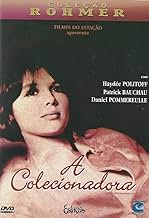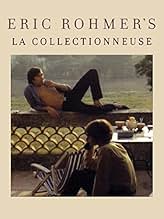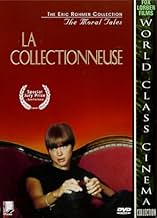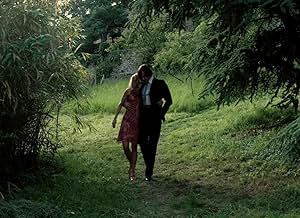IMDb-BEWERTUNG
7,3/10
10.409
IHRE BEWERTUNG
Ein weiblicher Kunsthändler und ein Maler finden die Heiterkeit ihres Riviera-Urlaubs durch einen dritten Gast gestört, eine lebhafte Bohemien-Frau, die für ihre lange Liste männlicher Erobe... Alles lesenEin weiblicher Kunsthändler und ein Maler finden die Heiterkeit ihres Riviera-Urlaubs durch einen dritten Gast gestört, eine lebhafte Bohemien-Frau, die für ihre lange Liste männlicher Eroberungen bekannt ist.Ein weiblicher Kunsthändler und ein Maler finden die Heiterkeit ihres Riviera-Urlaubs durch einen dritten Gast gestört, eine lebhafte Bohemien-Frau, die für ihre lange Liste männlicher Eroberungen bekannt ist.
- Auszeichnungen
- 2 Gewinne & 1 Nominierung insgesamt
Mijanou Bardot
- Carole
- (as Mijanou)
Eugene Archer
- Sam
- (Nicht genannt)
Brian Belshaw
- Haydée's boyfriend
- (Nicht genannt)
Pierre-Richard Bré
- Homme dans l'auto
- (Nicht genannt)
Donald Cammell
- Garçon à St-Tropez
- (Nicht genannt)
Alfred de Graff
- Touriste perdu
- (Nicht genannt)
Empfohlene Bewertungen
A young man (Patrick Bauchau) parts with his fiancée to vacation in the south of France, where he plans to catch up with an old friend and spend his time in solitude. His holiday idyll is perturbed by the presence of a young woman (Haydée Politoff), who he says is not his type, but spends an awful lot of his time thinking about. She's sexually free and while in search of what she's looking for in life, sleeps with various men, a fact that gets under his skin.
The film is appealing aesthetically because through various small observational details in the surroundings and in the introspective silences he allows in, Éric Rohmer transports us to this place and its feeling. Politoff is also appealing to say the least, and her character has such an innocent simplicity about her that she's charming to watch. These are the things that made the film for me.
What I disliked about it was the protagonist, who provides the narration and the point of view of the film. While Rohmer is making a point about male insecurity and this guy's issues (as well as the other guy there, who's also an idiot), I have to say, he's so cold and judgmental that he's not likeable. I would have loved a version of this film that was made from Haydée's perspective. To its credit, through dialogue she is allowed to express her opinions, e.g. That he should mind his own business, and her boredom as he prattles on with his tedious pseudo-intellectualism. The art dealer also provides quite a takedown of the young man's not working and general laziness. He seems empty as a person and I suppose we're meant to recognize that and compare it to Haydée, who presumably goes off to Italy at the end and gets more enjoyment out of life. It's just unfortunate that the film, through its title and its narration, seems to share some of the viewpoint of the young man.
Overall, however, I liked this film both times I've watched it, and thought it was wisely kept at just 83 minutes. It makes me feel as though I was on holiday, and the images of Haydée Politoff are indelible.
The film is appealing aesthetically because through various small observational details in the surroundings and in the introspective silences he allows in, Éric Rohmer transports us to this place and its feeling. Politoff is also appealing to say the least, and her character has such an innocent simplicity about her that she's charming to watch. These are the things that made the film for me.
What I disliked about it was the protagonist, who provides the narration and the point of view of the film. While Rohmer is making a point about male insecurity and this guy's issues (as well as the other guy there, who's also an idiot), I have to say, he's so cold and judgmental that he's not likeable. I would have loved a version of this film that was made from Haydée's perspective. To its credit, through dialogue she is allowed to express her opinions, e.g. That he should mind his own business, and her boredom as he prattles on with his tedious pseudo-intellectualism. The art dealer also provides quite a takedown of the young man's not working and general laziness. He seems empty as a person and I suppose we're meant to recognize that and compare it to Haydée, who presumably goes off to Italy at the end and gets more enjoyment out of life. It's just unfortunate that the film, through its title and its narration, seems to share some of the viewpoint of the young man.
Overall, however, I liked this film both times I've watched it, and thought it was wisely kept at just 83 minutes. It makes me feel as though I was on holiday, and the images of Haydée Politoff are indelible.
10totius
It's hard to explain what is the Rohmer's cinema. In his movies you can't find heroes, incredible adventures or great action sequences. Everything happens inside the mind of the characters, and the most important aspect is the psychology of them.
La Collectioneuse is simply the masterpiece of Rohmer.
The plot is very simple: two boys and one girl in their friend's house in St.Tropez. That's all. There are not incredible events that happen, they simply LIVE there. It's an typical situation of Rohmer who likes to study the evolution of love triangles, in different situations. The explanation of the development steps, made by the usual interior voice of the main character (Adrien), it's incredibly accurate and likely. It's fantastic that sometimes Adrien's thoughts look at first to be absurd, but even in this case if we reflect a bit to that we can realize that it's true, that really in similar cases we have non-sense thoughts like those. In this way, Rohmer is unique: the psycho-evolution of the characters is incredibly real. Dialogs, internal and not, are superb and the directing essential.
Rohmer shows us how it's possible to make a masterpiece with a ridiculous budget, and how an intellectual movie can be also enjoyable and not so heavy.
The vote, of course, can't be different by 10 out of 10.
La Collectioneuse is simply the masterpiece of Rohmer.
The plot is very simple: two boys and one girl in their friend's house in St.Tropez. That's all. There are not incredible events that happen, they simply LIVE there. It's an typical situation of Rohmer who likes to study the evolution of love triangles, in different situations. The explanation of the development steps, made by the usual interior voice of the main character (Adrien), it's incredibly accurate and likely. It's fantastic that sometimes Adrien's thoughts look at first to be absurd, but even in this case if we reflect a bit to that we can realize that it's true, that really in similar cases we have non-sense thoughts like those. In this way, Rohmer is unique: the psycho-evolution of the characters is incredibly real. Dialogs, internal and not, are superb and the directing essential.
Rohmer shows us how it's possible to make a masterpiece with a ridiculous budget, and how an intellectual movie can be also enjoyable and not so heavy.
The vote, of course, can't be different by 10 out of 10.
The arrogant and pretentious intellectual art dealer Adrien (Patrick Bauchau) invites his girlfriend to travel with him to the coast to spend one month vacation with his close friend and painter Daniel (Daniel Pommereulle) in the house of their Randolphe. Adrien expects to do nothing but read and rest in the house and meet a possible investor in an art gallery that he dreams on having; however she prefers to travel to London. When he arrives, he discovers that the sexy and promiscuous pleasure-seeking Haydee (Haydée Politoff) that had one nightstand with Randolphe is sharing the house with Daniel. Along the days, Adrien becomes obsessed in a sick game of humiliating Haydee and imaging that she is trying to seduce him; however, his lust for her increases but his moral rationalization of their possible relationship keeps them apart.
"La Collectionneuse" is an erotic tale of arrogance, false value judgment and pretentious intellectuality of a false moralist. The witty and cynical screenplay uses excessive narrative in off of the unlikable lead character Adrien that is despicable as well as his friend Daniel. Actually, the only likable character is the libertine Haydee that accepts passively the cruel comments and treatment of Adrien and Daniel. Eric Rohmer uses the successful idea of a triangle of love with two men and a woman of "Jules et Jim" in a different and monotonous approach. My vote is six.
Title (Brazil): "A Colecionadora" ("The Female Collector")
"La Collectionneuse" is an erotic tale of arrogance, false value judgment and pretentious intellectuality of a false moralist. The witty and cynical screenplay uses excessive narrative in off of the unlikable lead character Adrien that is despicable as well as his friend Daniel. Actually, the only likable character is the libertine Haydee that accepts passively the cruel comments and treatment of Adrien and Daniel. Eric Rohmer uses the successful idea of a triangle of love with two men and a woman of "Jules et Jim" in a different and monotonous approach. My vote is six.
Title (Brazil): "A Colecionadora" ("The Female Collector")
Eric Rohmer's movies are, it seems almost without exception, slow- burners that reward those with the patience to sit through them, preferably more than once in some cases, and think about whats being said as much as whats being shown. This, his first feature in colour requires considerable thought on the part of the viewer, serving up nothing in the way of dramatic excitement and featuring three loathsome main characters who's morals are very in keeping with the era of late- 60s self satisfaction and hedonistic excess. Not that the hedonism is very wild. Jimi Hendrix does not blast from the simple record player that sits near a chair and provides the only music in the film. No one smokes anything illegal or pops any pills, talks of Indian mystics or goes in for meditation. But there is the very liberated (nowadays we'd say reckless) attitude to casual sex, although we don't see very much; the relaxed tangle of naked legs half glimpsed through one doorway, a brief an unrevealing shot of the main protagonist, the disturbingly young looking Haydee, quietly enjoying the intimate attention of another one-night-stand. Otherwise it's all hints and the more effective for that. Haydee is the very image of a swinging-sixties bed hopper. Young, slender, independent, cool and seemingly amoral she wrecks the plans of Adrian, an art dealer with time on his hands, when he finds her resident in a borrowed holiday villa at which he intends to devote himself to doing nothing at all for a few weeks while his girlfriend is in London. Haydee's noisy night-time frolics disturb his sleep and offend his self- declared sense of morality and the added presence in the house of his lazy, grumpy painter-friend Daniel sets up a spiralling tension between them all. But this is pure Rohmer and that tension manifests itself not in fist-fights, broken furniture, tearful confessions and blood-letting, but insults, low-key/nigh-brow arguments, teasing, sniping and political manoeuvring. In fact the more one thinks about the film, and it's one of those movies that does hang around long after the credits, the more one realises it's actually rather more like real-life, certainly as most of us endure it from time to time, than the over-dramatic offerings we are used to from mainstream movie-makers. Haydee maybe cute, Adrien describes himself as handsome and the setting is idyllic but you really wouldn't like to be on holiday with these unsympathetic characters. Observing their antics from without is one thing but to be part of it would be a nightmare! Oddly with it's morality so perfectly fixed in it's own time, this seems far more like a film from the 1970s. Something in it's look and after-the-party sense of deflation and disenchantment fits in with that later decade. Seeing it without knowing the release date you might well guess at 1972 or even later. If Godard's BANDE A PARTE is set in a Swinging-Sixties that hasn't yet arrived, Rohmer's film portrays one that has already left the building, although it's after-effects continue to create a problem. It all sounds somewhat depressing on paper and to some extent it is! It's not an easy film but if you give it time and maybe second look, you might well find there is more to this outwardly simple tale than you thought.
In The Collector, the first feature-length film of the Six Moral Tales series, mind-games, strategies, and overt manipulation thwart the possibility of satisfying relationships. The 54-minute film is beautifully photographed and has an elegance, charm, and wit that bears favorable comparison with his more acclaimed works. Adrien (Patrick Bauchau), an art dealer, and Daniel (Daniel Pommereulle), a painter spend the summer in a house on the French Riviera. Also vacationing there is Haydee (Haydee Politoff), an elegant but rather aloof young woman who sleeps with many boys in the area and has earned the title of "collectionneuse", a collector of men. Adrien, smug and self-centered in a charming sort of way, is interested in Haydee but tells himself that her promiscuity is a trick for him to seduce her and he refuses.
The summer turns into a love triangle with Adrien convincing Daniel to pursue Haydee to ease the pressure of his own conflict between his rationalizing intellect and his passions. In the moral scheme of things, Haydee may represent the sexual revolution of the 60s and Adrien that of traditional morality, yet the film takes no sides, presenting the issues without judging the characters and giving us much to think about. The Collector is perhaps the most philosophical of the six but in the end the pursuit without passion leads to a feeling of emptiness and missed opportunities. Like most of Rohmer's films, there are no peak dramatic moments or confrontations, just everyday life elevated into art.
The summer turns into a love triangle with Adrien convincing Daniel to pursue Haydee to ease the pressure of his own conflict between his rationalizing intellect and his passions. In the moral scheme of things, Haydee may represent the sexual revolution of the 60s and Adrien that of traditional morality, yet the film takes no sides, presenting the issues without judging the characters and giving us much to think about. The Collector is perhaps the most philosophical of the six but in the end the pursuit without passion leads to a feeling of emptiness and missed opportunities. Like most of Rohmer's films, there are no peak dramatic moments or confrontations, just everyday life elevated into art.
Wusstest du schon
- WissenswertesÉric Rohmer's first color film.
- VerbindungenFeatured in Uuden aallon jäljillä (2009)
Top-Auswahl
Melde dich zum Bewerten an und greife auf die Watchlist für personalisierte Empfehlungen zu.
Details
- Erscheinungsdatum
- Herkunftsland
- Offizieller Standort
- Sprachen
- Auch bekannt als
- The Collector
- Drehorte
- Côte d'Azur, Frankreich(coastal line and landscapes)
- Produktionsfirmen
- Weitere beteiligte Unternehmen bei IMDbPro anzeigen
Box Office
- Weltweiter Bruttoertrag
- 7.077 $
- Laufzeit1 Stunde 26 Minuten
- Sound-Mix
- Seitenverhältnis
- 1.37 : 1
Zu dieser Seite beitragen
Bearbeitung vorschlagen oder fehlenden Inhalt hinzufügen


![Bande-annonce [OV] ansehen](https://m.media-amazon.com/images/M/MV5BMjA2ZGRjY2QtNmMzMy00MjE3LWI1YzUtZTZiZDQ5YzY0YWIxXkEyXkFqcGdeQXRyYW5zY29kZS13b3JrZmxvdw@@._V1_QL75_UX500_CR0)

























